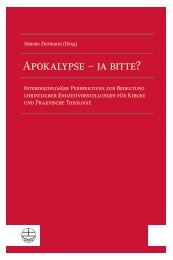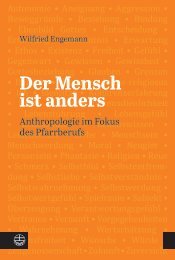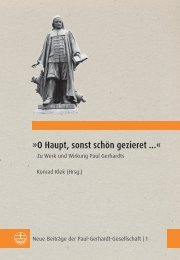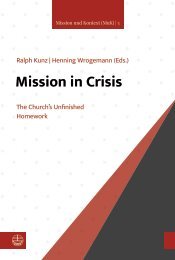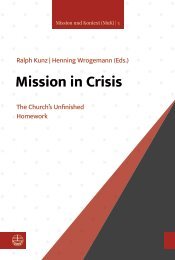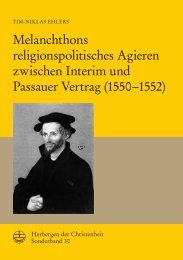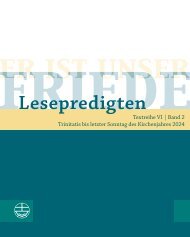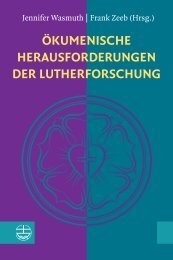Stephen Pickard | Michael Welker | John Witte (Eds.): The Impact of Education (Leseprobe)
This book investigates the impact of education on the formation of character, moral education and the communication of values in late modern pluralistic societies. Scholars from four continents and many different academic fields are involved. While the basic framework for the contributions is informed by Christian traditions, the disciplines cover a significant range, including theology, education, psychology, literature, anthropology, law, and business. This makes for a rich variety of thematic concentrations and perspectives. Readers will quickly sense that the educational foundations and trajectories of any given country are pervasive and have a significant reach into the fabric and shape of the society and its values, making education a barometer of the well-being of a people and their culture. The result is a volume that will inform, stimulate and challenge our understanding of the role of education in contemporary societies.
This book investigates the impact of education on the formation of character, moral education and the communication of values in late modern pluralistic societies. Scholars from four continents and many different academic fields are involved. While the basic framework for the contributions is informed by Christian traditions, the disciplines cover a significant range, including theology, education, psychology, literature, anthropology, law, and business. This makes for a rich variety of thematic concentrations and perspectives. Readers will quickly sense that the educational foundations and trajectories of any given country are pervasive and have a significant reach into the fabric and shape of the society and its values, making education a barometer of the well-being of a people and their culture. The result is a volume that will inform, stimulate and challenge our understanding of the role of education in contemporary societies.
You also want an ePaper? Increase the reach of your titles
YUMPU automatically turns print PDFs into web optimized ePapers that Google loves.
Introduction 17<br />
areas.” Springhart focuses on how religion and the churches played avital role in<br />
the reeducation process, which was strongly influenced by therapeutic models <strong>of</strong><br />
recovery from social and cultural psychosis. <strong>The</strong>re is aplace here for an educational<br />
therapeuticdesigned to shape and strengthen character at both the individual<br />
and the national level. Important in this respect is Talcott Parsons’sconcept<strong>of</strong><br />
“controlled institutional change,” which included aform <strong>of</strong> religion to help shape<br />
afree, democratic societyand act as acritical counterpart to the impact <strong>of</strong> National<br />
Socialism.<strong>The</strong> premise was simple:democracy was primarilyaway <strong>of</strong> life, and<br />
healthy social institutions provided avital component in the process <strong>of</strong> reeducation<br />
and characterformation. Springhartshows the extensive international cooperation<br />
and sharedlearning entailed in the reeducation process; draws attention<br />
to the significance <strong>of</strong> and continuingimpact <strong>of</strong> Protestant Academiesinpostwar<br />
Germany as sources <strong>of</strong> moral and spiritual support; highlightsthe role <strong>of</strong> women<br />
in the educative and political process in anew German society; and recalls the<br />
significance <strong>of</strong> church-based welfare organizations. Importantly, Springhart underscores<br />
the importance <strong>of</strong> religion in tempering the alienating aspects <strong>of</strong><br />
change and keeping alive in society questions <strong>of</strong>meaning and purpose. Overall,<br />
we are leftwith the two complementary ecclesial and theological impulses in the<br />
process <strong>of</strong> educationfor ademocratic way <strong>of</strong> life: stabilizing continuity and transforming<br />
spirituality.<br />
Jo-Anne Reid (“School <strong>Education</strong> in Australia: Building Character and Reforming<br />
the Nation”) focuses on the role <strong>of</strong> school education asameans for reforming<br />
national character. <strong>The</strong> background is the continuing tension between<br />
asystemicracism that emerged from Anglo-Saxon colonization in the late eighteenth<br />
century and the fact that Australia is one <strong>of</strong> the most culturally and linguistically<br />
diverse societies in the world. Reid argues that “the challenge <strong>of</strong> shaping a<br />
population that will continue to uphold the values <strong>of</strong> apluralistsociety is largely<br />
entrusted to the education system, through its national ‘civics and citizenship’<br />
curriculum.” Given the diversity <strong>of</strong> cultures, races, languages, and values “schooling<br />
may well be the only sharedsocial institution that young people participate in<br />
prior to exercising their rights as citizens.”<br />
This is atall order for any education system. It is made even more problematic<br />
because Australian educationstillreflects aset <strong>of</strong> Christianvalues contaminated<br />
by desires for wealth and status, founded on the “convenient lie <strong>of</strong> Australia as<br />
terra nullius,” which has been responsible for the emergence <strong>of</strong> avariety <strong>of</strong> discriminatory<br />
and undemocratic social outcomes. As aconsequence, amajor task<br />
for Australian education is to engage with a “decolonializing curriculum for educating<br />
the next generation <strong>of</strong> young Australians.” How well or otherwise this task<br />
is undertaken will determine the kind <strong>of</strong> society—its character and values—that<br />
coming generations will inherit and live by. Reid highlights the differences between<br />
educationwithin the framework <strong>of</strong> an essentially British school system and<br />
the broader European notions <strong>of</strong> character building as asocial and cultural sub-





